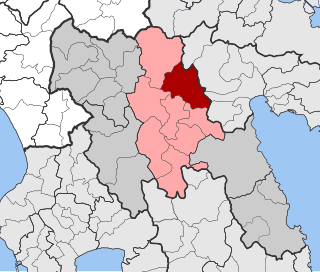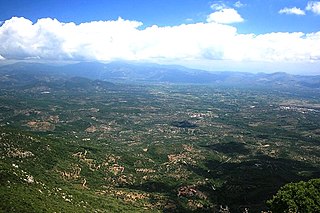
The Peloponnesian War was an ancient Greek war fought between Athens and Sparta and their respective allies for the hegemony of the Greek world. The war remained undecided for a long time, until the decisive intervention of the Persian Empire in support of Sparta. Led by Lysander, the Spartan fleet, built with Persian subsidies, finally defeated Athens and started a period of Spartan hegemony over Greece.

Sparta was a prominent city-state in Laconia in ancient Greece. In antiquity, the city-state was known as Lacedaemon, while the name Sparta referred to its main settlement on the banks of the Eurotas River in Laconia, in south-eastern Peloponnese. Around 650 BC, it rose to become the dominant military land-power in ancient Greece.

Lysander was a Spartan military and political leader. He destroyed the Athenian fleet at the Battle of Aegospotami in 405 BC, forcing Athens to capitulate and bringing the Peloponnesian War to an end. He then played a key role in Sparta's domination of Greece for the next decade until his death at the Battle of Haliartus.

Ancient Greece was a northeastern Mediterranean civilization, existing from the Greek Dark Ages of the 12th–9th centuries BC to the end of classical antiquity, that comprised a loose collection of culturally and linguistically related city-states and other territories. Most of these regions were officially unified only once, for 13 years, under Alexander the Great's empire from 336 to 323 BC. In Western history, the era of classical antiquity was immediately followed by the Early Middle Ages and the Byzantine period.

The Battle of Leuctra was a battle fought on 6 July 371 BC between the Boeotians led by the Thebans, and the Spartans along with their allies amidst the post-Corinthian War conflict. The battle took place in the vicinity of Leuctra, a village in Boeotia in the territory of Thespiae. The Theban victory shattered Sparta's immense influence over the Greek peninsula, which Sparta had gained with its victory in the Peloponnesian War a generation earlier.

Leonidas I was a Greek king of the Greek city-state of Sparta, and the 17th of the Agiad line, a dynasty which claimed descent from the mythical demigod Heracles. Leonidas I was a son of King Anaxandridas II. He succeeded his half-brother King Cleomenes I to the throne in c. 489 BC. His co-ruler was King Leotychidas. He was succeeded by his son, King Pleistarchus.

The Gymnopaedia was an annual festival celebrated exclusively in ancient Sparta, helped to define Spartan identity. It featured generations of naked Spartan men participating in war dancing and choral singing, with a large emphasis placed on age and generational groups. It is believed that celebration of this festival began in 668 BCE to honour a Spartan victory in Thyrea. The festival likely evolved over time to celebrate other Spartan victories such as that over the Argives in the Battle of the Champions. The Gymnopaedia was primarily in honour of Apollo, but also celebrated Artemis and Leto, who served as representations of the childhood which would soon be left behind by the young participants. Though the festival was ritualistic, it should not necessarily be interpreted as religious. Pausanias describes the Gymnopaedia as "a festival which the Lacedaemonians take more seriously than any other".

Mantineia was a city in ancient Arcadia, Greece, which was the site of two significant battles in Classical Greek history.
Cleomenes I was Agiad King of Sparta from c. 524 to c. 490 BC. One of the most important Spartan kings, Cleomenes was instrumental in organising the Greek resistance against the Persian Empire of Darius, as well as shaping the geopolitical balance of Classical Greece.
Laconophilia is love or admiration of Sparta and of the Spartan culture or constitution. The term derives from Laconia, the part of the Peloponnesus where the Spartans lived.

300 is a historically inspired 1998 comic book limited series written and illustrated by Frank Miller with painted colors by Lynn Varley.

300 is a 2006 American epic historical action film loosely based on the 1998 comic series of the same name by Frank Miller and Lynn Varley. Both are fictionalized retellings of the Battle of Thermopylae in the Greco-Persian Wars. The film was co-written and directed by Zack Snyder, while Miller served as executive producer and consultant. It was filmed mostly with a superimposition chroma key technique to replicate the imagery of the original comic book. The plot revolves around King Leonidas, who leads 300 Spartans into battle against the Persian "God-King" Xerxes and his invading army of more than 300,000 soldiers. As the battle rages, Queen Gorgo attempts to rally support in Sparta for her husband.

The Last of the Wine is Mary Renault's first novel set in ancient Greece, the setting that would become her most important arena. The novel was published in 1956 and is the second of her works to feature male homosexuality as a major theme. It was a bestseller within the gay community. The book is a portrait of Athens at the close of the Golden Age and the end of the Peloponnesian War with Sparta, and includes Socrates as a character.

Gates of Fire is a 1998 historical fiction novel by Steven Pressfield that recounts the Battle of Thermopylae through Xeones, a perioikos born in Astakos, and one of only three Greek survivors of the battle.
Gorgo was a Spartan woman and wife to King Leonidas I. She was the daughter and the only known child of Cleomenes I, Leonidas' half-brother and King of Sparta. Gorgo was also the mother of King Pleistarchus, her only son with King Leonidas I. She is notably one of the few female historical figures actually named by Herodotus, and is depicted in sources as intelligent and wise. Her birth date is uncertain, but based on Herodotus' dating, it is most likely to have been between 518 and 508 BC.

Classical Greece was a period of around 200 years in Ancient Greece, marked by much of the eastern Aegean and northern regions of Greek culture gaining increased autonomy from the Persian Empire; the peak flourishing of democratic Athens; the First and Second Peloponnesian Wars; the Spartan and then Theban hegemonies; and the expansion of Macedonia under Philip II. Much of the early defining politics, artistic thought, scientific thought, theatre, literature and philosophy of Western civilization derives from this period of Greek history, which had a powerful influence on the later Roman Empire. Part of the broader era of classical antiquity, the classical Greek era ended after Philip II's unification of most of the Greek world against the common enemy of the Persian Empire, which was conquered within 13 years during the wars of Alexander the Great, Philip's son.

The First Messenian War was a war between Messenia and Sparta. It began in 743 BC and ended in 724 BC, according to the dates given by Pausanias.

The History of Sparta describes the history of the ancient Doric Greek city-state known as Sparta from its beginning in the legendary period to its incorporation into the Achaean League under the late Roman Republic, as Allied State, in 146 BC, a period of roughly 1000 years. Since the Dorians were not the first to settle the valley of the Eurotas River in the Peloponnesus of Greece, the preceding Mycenaean and Stone Age periods are described as well. Sparta went on to become a district of modern Greece. Brief mention is made of events in the post-classical periods.

Christian Gordon Cameron, also known as Miles Cameron and Gordon Kent, is a Canadian novelist. He was educated and trained as both a historian and a former career officer in the US Navy. His best-known work is the historical fiction series Tyrant, which by 2009 had sold over 100,000 copies.

Caroline Dale Snedeker née Parke was an American writer, primarily of children's historical novels. Two of her books, Downright Dencey and The Forgotten Daughter, were runners-up for the Newbery Medal. On occasion she used the pen name Caroline Dale Owen.
















